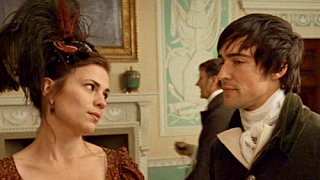Mansfield Park - Jane Austen
"What became of Miss Austen?" we might ask, echoing the critic Kingsley Amis, when confronted with 'Mansfield Park''s heroine Fanny Price. Compared to the sparkling Elizabeth Bennet whose opinions were voiced loudly enough to resonate with a still captivated 21st Century audience, Fanny is a little limp, underwhelming, or as Austen's mother put it so marvellously herself, 'insipid'.
Brought into her cousins' household at Mansfield Park as a gesture of insincere benevolence towards Fanny's impoverished mother, Fanny's lack of pizzaz can perhaps be explained by the absence of warmth from her adoptive family. The novel is accurately named, as life is neatly contained by the imposing walls of the Mansfield Park estate. Guests pass each other on their way into and out of its doors like players upon a stage - and only when outside influences threaten the estate's moral superiority and stability does trouble ensue. The theatrical metaphor is entirely appropriate, as it is when Fanny's uncle Sir Thomas leaves to manage the trouble brewing on his Antiguan plantations (which fund life at Mansfield Park) that the outrageous production of 'Lover's Vows' is allowed to go ahead. Taking her cue from love interest and cousin Edmund, Fanny's sense of decorum is threatened the wild flirtation and inappropriate behaviour that will go unrestrained behind behind the theatre's closed curtain.
Adultery is rarely a theme for Austen's novels, but at Mansfield Park it takes centre stage (ok, I promise I'll stop with histrionic puns). All manner of characters mingle here, from the deliciously annoying Mrs Norris* whose character retains vestiges of that perfect Austenian cynicism and wit, to the charming Mary Crawford whose enticing modernity, looser morals and cosmopolitan lifestyle soon catch Edmund's eye.
Enthusiasm is helpful on the part of the reader to engage with the plot's revelations and twists, which could otherwise be a little underwhelming for the modern audience for whom there is nothing new under the sun.
 |
The novel is offers more in the way of material for literary analysis than the promise of a thrilling read, with issues such as colonialism, slavery, morality and the threat of modernity all brought to the fore. With a little imagination, critics from Virginia Woolf to Edward Said have drawn out some interesting comparisons and suggestions - not all of them immediately evident from Austen's prose. Later work has added to these lines of analysis such as Patricia
Rozema's 1999 adaptation of Mansfield Park, which sets the tone of
post-colonial critique with a slave-ship moored offshore in the
opening scene.
 |
My verdict: Claire Tomalin has it right when she reflects the ambivalence that many readers feel towards Fanny: "More is made of Fanny Price's faith, which gives her the courage to resist what she thinks is wrong; it also makes her intolerant of sinners, whom she is ready to cast aside." Modern sensibilities noted, I still feel that if only Fanny were a more captivating heroine, I would much prefer the novel. Even Austen's mum agreed!
*Yes, J.K. Rowling did name Filch's cat after Fanny's insufferable aunt.




No comments:
Post a Comment